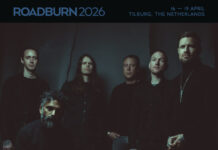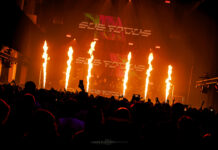On August 23rd, 2024, avant-garde metal outfit ZEAL & ARDOR are releasing their new album, “Greif.” We had the opportunity to chat with frontman Manuel Gagneux, vocalist Marc Obrist, and bass player Lukas Kurmann about their summer tour, the upcoming album, and future plans. Watch the interview here or read the complete transcript below…
Hi there! Thanks so much for taking the time today. How are you guys doing?
Manuel: Really well. We had some nice food, got to the hotel—it’s a beautiful hotel, which is a nice change from our last couple of days. This is the last day of our festival run, and I think people are both happy and elated. I think we’re going to have… the last bit of energy is going to come out tonight.
Lukas: This run is about ten days or something. It’s very mixed situations—huge festivals and then small indoor club shows and everything. It’s been a rollercoaster of emotions, but it’s been great.
You’ve been releasing some new music and are releasing a new album in a few weeks. Have you been playing any of the songs live so far?
Manuel: We play a couple of them, and it’s going well. It’s going better than it was at the beginning of the tour [laughs], to be honest. It’s fun because for people to be at a live show and then hear a new song, I think it’s kind of exciting and gives a little more worth to the live performance.
Lukas: Yeah, I think it’s cool to play unreleased stuff.
Were they actually unreleased, or did you play the singles?
Lukas: We have a few songs in the set that haven’t been released yet, so it’s like we slap it to the audience to see what comes out. It’s funny.
What sort of songs? Are they a lot heavier?
Manuel: I’m afraid not. [laughter]
It seems like the new songs have a bit of a directional shift and are more atmospheric. Is that something you specifically wanted to try out?
Manuel: It wasn’t an effort to be softer or more experimental. It’s just what I felt at the moment, and then we recorded it, and now we have it.
When did you first lay hands on the new album?
Manuel: I wrote the songs, and we all recorded them together. I think it was like a year ago, maybe?
Marc: Yeah, I think so.
Manuel: Now it’s like the end of the Ouroboros.
That seems like a relatively fast process.
Manuel: I would say that I am too quickly satisfied with it. I’m not a perfectionist; I work in volume. Luckily, I have these people who say, “Actually Manu, that sounds like shit!” [laughter]
Lukas: I mean, not just like that, but also in between. It’s really interesting—you come in with the songs, really raw demos that already sound complete, but we still have a lot of possibilities to work on the stuff. With this album, especially on the vocals, what happened from the demo to the full recording is just amazing to see. He writes the songs, so we are not involved in the process, but in the recording, still, stuff happens. Magic happens.
Marc: We are different people, so we are not different like Manuel did. It naturally sounds different. Sometimes that’s good; sometimes maybe not. But we are trying our best to make the songs really good.
How important is it for you guys to have open communication where you can actually be honest about what you like and what not?
Manuel: I think as of late we’re far more open and direct with each other. It’s been amazing. I think there are no secrets or, correct me if I’m wrong—but I don’t think so. I don’t think someone thinks, “Ugh, this is really bad,” and never says anything.
Marc: I think the same. We’re trying to make the best out of the situation…
Manuel: [laughs] That sounds like a crisis. [laughter]
Marc: No, it’s not! [laughs] No, it’s not. No, it’s not. Just make it cool and make it so that people like it and that we like it as well.
Lukas: I mean, naturally, from where the project comes from as a total one-man show in the beginning to having a fixed live band where we were involved in the live playing, now we are more involved in the studio recording as well. As you said, it’s a process. We learned, I learned that it’s okay to put my mind into this and then see what’s the echo. It’s been very interesting; we go on like that.
Was it hard for you to let go of that control when you decided to go from a one-man project to a band?
Manuel: Conceptually, it was at the beginning, but then I invited them in because ZEAL & ARDOR is more the live band in my mind. It’s what happens on the stage and not what happens on my laptop. So for me, it just makes perfect sense because the live stuff sounds better. Sorry [laughs]. So I want that live on the record.
Today is going to be my first time seeing your show. For people who have missed out on you so far like me, what does a ZEAL & ARDOR show entail?
Marc: It’s a good rock show, let’s say that. [laughter]
Lukas: There’s no show element like in a theater or a musical. We are six people standing on stage, having a front line with the drums, and we’re just blasting stuff out. That’s our show. That’s what we do.
Manuel: Yeah, seems to work.
Marc: Yeah, scream our souls out.
You have these bands like IRON MAIDEN who are very gimmicky and have a huge production. Is letting the music speak the most important part of a show for you?
Manuel: Maybe. Maybe if the music kind of sucks or would be boring, we’d invite a dragon or something. [laughs] At the moment, it seems to work. It’s kind of pure and direct, and I like it a lot.
Marc: We tried it once at the first concert and never did it again. [laughs]
You invited a dragon? [laughs]
Marc: No, no! Just some elements of theatricality. But yeah, we canceled it after the first show.
Manuel: Alas.
Lukas: I said it from the beginning that we’ve got to get lasers. Nobody listens to me, but maybe one day, you know.
But lasers can also be cool.
Lukas: You know, like the lasers that are a dome, the laser dome, like in the techno parties.
Marc: We need lasers.
Your previous album was received very well and gave you a big boost. Did you experience any pressure while songwriting its follow-up?
Manuel: Probably there was constantly, but we did what we did because we never really had time to put our heads above water and breathe and check out the situation. We just functioned, I’d say.
Marc: Yeah.
Manuel: It’s terrible. [laughter]
You mean the new album? [laughs]
Manuel: No, life in general. [laughs] No, no, no.
Did you experience any challenges while working on “Greif”?
Manuel: I have a lot of output. I don’t really think too much about it. It’s basically getting rid of what is bad. So I guess the 9-to-5 of it: I get up in the morning, drink coffee, go to my room at 9:00… Or 10:00, let’s be honest. [laughter] Then write music till 12. It’s a creative thing, but it becomes a routine, and there’s a weird line that can’t be crossed, and I can’t define it.
Marc: Yeah, and I need some structures in my life, otherwise it would not work. I have the studio, also the studio where we recorded the last two, three records. So yeah, at my end, I organized all the dates and timings so it would work with the deadlines and stuff. I think it worked out. We have a new album out soon.
The new album is titled “Greif.” Is there a meaning behind the title?
Manuel: It’s a reference to a tradition in our hometown, where this griffin (der Greif) does a weird dance and shows its backside to the rich part of the city. I just thought that was a cool thing. It’s an 800-year-old tradition, and it’s like “fuck the rich people,” which I can kind of get behind, until people buy enough of the albums. [laughs]
I really wonder what your music will be about when that happens, “fuck the poor.”
Manuel: Clean the pool quick, helicopter luggage limits, I don’t know… [laughter]
So speaking of, is there still a strong concept present in the lyrics?
Manuel: I think it’s more loose than the other ones. I think we allowed ourselves to have more fun and more freedom, and I think that’s a good decision.
Looking forward to hearing the end result! Once you release the album, what are the next steps for ZEAL & ARDOR?
Lukas: We have pretty intense touring coming up, this and next year. So we’re going to mainly start focusing on that. A cycle like that is always kind of demanding, especially if you are at the beginning. It’s always very demanding. You need to get up to speed, in the form of being able to tour all the time, coming home, going on tour, coming home. I think we will entirely focus on that for the next few months.
Manuel: First, HEILUNG, then a US tour, hopefully…
Marc: Then we will see next year…
Manuel: Yeah, there will be some shows.
Lukas: Quite a lot of unconfirmed plans.
Are you already working on the preproduction of the tour, or is that too soon?
Manuel: We are 80% there to have no life until next year.
What does that process look like?
Manuel: I get emails that say, “Your life is going to look like this for the rest of the year.” [laughs]
Lukas: Also, putting the shows together from a production standpoint. It’s a lot about bringing the steps together to transform how it sounds, the music, into a live setting, which includes capturing amp sounds, designing guitar tones, effects, and then bringing the session together. At some point, it gets together with the light show. The past half year was a lot about designing stuff like that for us as a band, but also for the related crew. That’s quite big.
So you do production as well, right?
Lukas: Yes.
Manuel: I’m too stupid for that, that’s why I have competent people around me. [laughter]
What is it like for you to double duty? Isn’t that quite a handful?
Lukas: Sometimes it’s stressful, especially at the beginning, when everythingis now, and especially if something doesn’t work well. Of course, that can be kind of stressful. But also, I think that it’s a good thing to have in the band because of the interface between the music and the performance of the band. The whole monster robot kind of thing. It’s good to have a band standpoint for that. I mean, ask me again in a year…
Have you been doing that for a long time?
Lukas: It was you mostly doing that for the last few years…
Marc: Yeah, from more or less the beginning, I did it. It’s quite a stressful job, and I also did the studio stuff, so it became too much for me. We split it up, so now Lukas is on things. It’s tough doing double duty, especially when you’re on stage and something’s not good. Then your brain is going to do funny things. We do it like that, and it’s pretty good to have someone in the band that really knows what is going on. I think that makes everyone feel safer.
Alright! Well, thank you guys so much for your time and doing this interview quite spontaneously. I think that’s pretty much it for our time. Do you have any last thoughts you want to share?
Manuel: Just be yourself. If you have the funds, why not buy a record? They’re great. [laughs]





